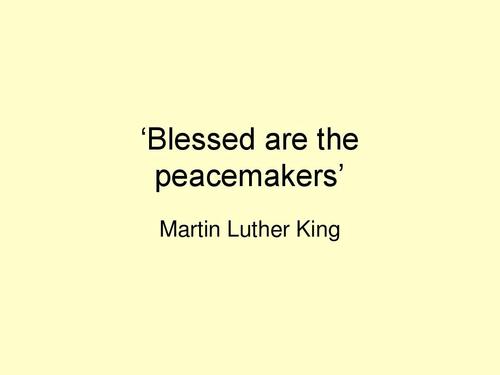
Blessed Are the Peacemakers
Have you ever wondered what it truly means to be a peacemaker? In a world that is often filled with conflict and discord, the role of a peacemaker is both vital and inspiring. This article delves into the multifaceted nature of peacemaking, exploring its historical significance, practical applications, and the profound impact it has on individuals and societies.
Historical Perspective
Peacemaking has been a cornerstone of human civilization since ancient times. From the legendary tales of King Solomon resolving disputes between two women to the modern-day efforts of international peacekeepers, the concept of peacemaking has evolved over the centuries. The historical records show that peacemaking has played a crucial role in shaping the world we live in today.
| Time Period | Notable Peacemakers | Significant Events |
|---|---|---|
| Ancient Times | King Solomon, Buddha | Resolution of disputes, promotion of peace |
| Medieval Period | St. Francis of Assisi, Eleanor of Aquitaine | Efforts to end religious conflicts, establishment of peace treaties |
| Modern Era | Nelson Mandela, Mother Teresa | Advocacy for human rights, reconciliation after conflicts |
Throughout history, peacemakers have come from various walks of life, including royalty, religious leaders, and ordinary citizens. Their actions have often been driven by a deep sense of compassion, empathy, and a desire to create a better world for future generations.
Practical Applications
In today’s world, the need for peacemaking is more pressing than ever. Conflicts arise in various forms, from interpersonal disputes to global conflicts. Here are some practical applications of peacemaking in different contexts:
-
In the workplace, peacemaking can help resolve conflicts between colleagues, fostering a more harmonious and productive environment.
-
In communities, peacemaking can address issues such as gang violence, racism, and discrimination, promoting social cohesion and inclusivity.

-
In international relations, peacemaking can help prevent wars, negotiate peace agreements, and promote diplomatic resolutions to conflicts.
One notable example of peacemaking in action is the Truth and Reconciliation Commission (TRC) in South Africa. Established after the end of apartheid, the TRC aimed to address the human rights violations committed during the regime. Through a process of truth-telling, healing, and reconciliation, the TRC helped bring closure to many victims and contributed to the nation’s healing process.
The Impact of Peacemaking
The impact of peacemaking is profound and far-reaching. It not only resolves conflicts but also has a lasting effect on individuals and societies. Here are some of the key benefits of peacemaking:
-
Personal Growth: Peacemaking encourages individuals to develop empathy, compassion, and conflict-resolution skills, leading to personal growth and self-awareness.
-
Social Cohesion: By addressing conflicts and promoting understanding, peacemaking strengthens social bonds and fosters a sense of community.
-
Global Stability: Peacemaking contributes to global stability by preventing conflicts, promoting diplomatic resolutions, and reducing the risk of war.
Moreover, peacemaking has a ripple effect, inspiring others to take action and contribute to the cause of peace. It creates a positive cycle of change, where acts of kindness and compassion lead to more peace and understanding.
Conclusion
Blessed are the peacemakers, for they shall be called children of God. In a world that is often filled with conflict and discord, the role of a peacemaker is both vital and inspiring. By embracing the principles of empathy, compassion,



